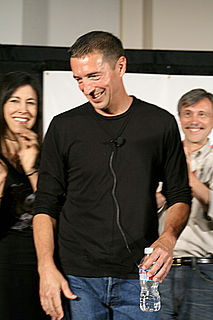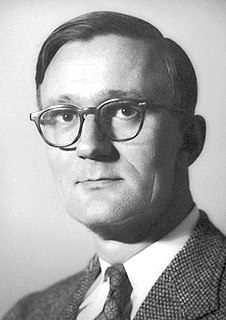A Quote by Thomas Jefferson
I am satisfied, and sufficiently occupied with the things which are, without tormenting or troubling myself about those which may indeed be, but of which I have no evidence.
Related Quotes
Divine Scripture is wont to frame, as it were, allurements for children from the things which are found in the creature; whereby, according to their measure, and as it were by steps, the affections of the weak may be moved to seek those things that are above, and to leave those things that are below. But the same Scripture rarely employs those things which are spoken properly of God, and are not found in any creature; as, for instance, that which was said to Moses, I am that I am; and, I Am has sent me to you."
In general it may be said that the things which we take for granted without inquiry or reflection are just the things which determine our conscious thinking and decide our conclusions. And these habitudes which lie below the level of reflection are just those which have been formed in the constant give and take of relationship with others.
Generally we are occupied either with the miseries which now we feel, or with those which threaten; and even when we see ourselves sufficiently secure from the approach of either, still fretfulness, though unwarranted by either present or expected affliction, fails not to spring up from the deep recesses of the heart, where its roots naturally grow, and to fill the soul with its poison.
A man's true greatness lies in the consciousness of an honest purpose in life, founded on a just estimate of himself and everything else, on frequent self-examinations, and a steady obedience to the rule which he knows to be right, without troubling himself about what others may think or say, or whether they do or do not that which he thinks and says and does.
Knowledge signifies things known. Where there are no things known, there is no knowledge. Where there are no things to be known, there can be no knowledge. We have observed that every science, that is, every branch of knowledge, is compounded of certain facts, of which our sensations furnish the evidence. Where no such evidence is supplied, we are without data; we are without first premises; and when, without these, we attempt to build up a science, we do as those who raise edifices without foundations. And what do such builders construct? Castles in the air.
In writing, as in life, faults are endured without disgust when they are associated with transcendent merit, and may be sometimes recommended to weak judgments by the lustre which they obtain from their union with excellence; but it is the business of those who presume to superintend the taste or morals of mankind to separate delusive combinations, and distinguish that which may be praised from that which can only be excused.
It's basically the same in all periods of societies. If you belong to the majority, you can avoid thinking about lots of troubling things.' 'And those troubling things are all you /can/ think about when you're one of the few.' 'That's about the size of it,' she said mournfully. 'But maybe, if you're in a situation like that, you learn to think for yourself.' 'Yes, but maybe what you end up thinking for yourself /about/ is all those troubling things.
Let us take a patriot, where we can meet him; and, that we may not flatter ourselves by false appearances, distinguish those marks which are certain, from those which may deceive; for a man may have the external appearance of a patriot, without the constituent qualities; as false coins have often lustre, though they want weight.
I have said this to explain the stanza that follows, in which the soul replies to those who call in question its holy tranquillity, who will have it wholly occupied with outward duties, that its light may shine before the world: these persons have no conception of the fibres and the unseen root whence the sap is drawn, and which nourish the fruit.

































